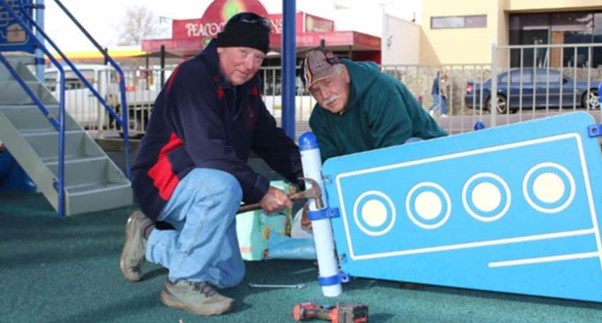Port Lincoln’s “Tuna Boat” playground will set course for a foreign land as part of the Rotary Overseas Recycled Playgrounds initiative.

Local Rotarians Tony Stockham and Glenn Karutz dissembling the ‘Tuna Boat’ at the Andrew Small Playground. Photo: City of Port Lincoln.
The play equipment at the Andrew Small playground is being removed as part of the Port Lincoln foreshore project.
However, one piece of equipment, the ‘Tuna Boat’, will have a new life when it is relocated to a developing nation as part of an ongoing initiative by Rotary.
The Rotary Overseas Recycled Playgrounds (RORP) project sees Rotary Clubs partnering with local councils to save disused playground equipment from landfill and repurpose it for children in developing countries.
Peter Baur, the chair of RORP in South Australia and a Rotary Club of Mount Barker member, said the program began in Victoria in 2019 and came to South Australia in 2021 when Rotary was contacted about recycling old playground equipment.
“The Mount Barker Council had a playground which they didn’t want to send to landfill and thought it would be a good idea if we could recycle it somehow,” Baur said.
“They got in touch with Rotary in Victoria who were starting up a project called RORP, and recycling playgrounds to send overseas.”
Baur said that the Victorian Rotary group then reached out to the Rotary Club of Mount Barker about starting the RORP project in South Australia.

Rotarians loading a container of playground equipment destined for Mongolia earlier this year. Photo: supplied.
The Rotary Club of Mount Barker has become the project’s head in South Australia and now has a relationship with 10 councils across the state, with 21 playgrounds set for relocation.
“When they have a playground to pull down, they give us a call, we go and inspect the playground to make sure that it’s safe and in good condition,” Baur said.
“If there’s any timber in it, like timber posts in particular, they can’t generally be sent overseas because most third-world countries are in tropical areas and white ants are a real problem.”
The local councils are also asked to donate to cover the shipping costs, which Baur said is typically offset by their normal contractor costs for dismantling the playground or dumping it in landfill.
“We generally like to send the playgrounds to Rotary Clubs, then we’ve got a responsible entity in the other accepting area who can manage the process of having it reinstalled.”
Aside from the environmental factor of saving the playgrounds from landfill, Baur said the playgrounds are also beneficial for the children who will get to play on them.
“There’s a lot of children overseas who have never had the joy of playing on a playground,” he said.
“The feedback we’re getting from the places the playgrounds go to, particularly schools and things like that, is that playgrounds are crucial in the children’s development.
“It has a dual effect, I guess. It helps in their development as well as giving them some joy.”
Port Lincoln Mayor Diana Mislov said that local Rotary volunteers partnered with council contractors to dismantle the Tuna Boat before it is stored in Adelaide ready for shipment.
“It is heartwarming to be involved in such great initiatives (with) our local Rotary Club,” Mislov said.
Words: Clem Stanley



